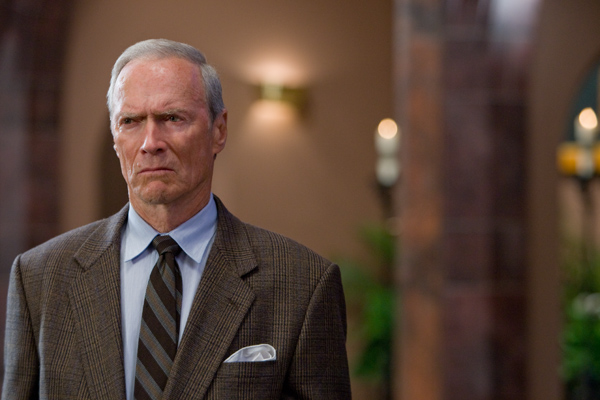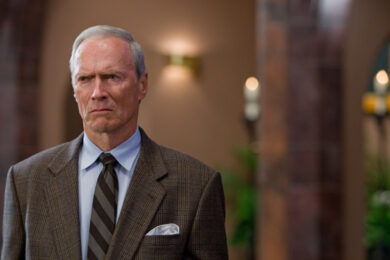Click here for our gallery of cinematic swan songs
Legend has it that Laurence Olivier once told a young Clint Eastwood that the one thing an actor cannot fake on camera is physical strength. Which is to say that, even if you’re not wearing a vest and a gun-belt with veins popping out of your tree-trunk neck, if you are actually strong, you will naturally carry yourself in a way that sends off alarm bells in everyone’s fight-or-flight mechanism. Olivier’s simple aphorism explains a lot about Clint’s monumental on-screen presence. He doesn’t speak much or posture or have to prove anything yet he always oozes danger – his gruff delivery is just the tip of the violent iceberg.
It is in some ways appropriate that Gran Torino is supposedly Clint’s last on-screen performance (unless this is some Jay-Z-esque attention seeking ploy) because the character of Walt Kowalski is like a nostalgic summing up of his entire acting career. From his terse western outlaws to the wreckless Dirty Harry to the grizzled old men of his later films – all these past lives are written into the lines of Kowalski’s bitter face.
What always made Clint Eastwood characters so interesting was their amorality. While the two-dimensional John Wayne style heroes (which Clint unseated in the late 60s) could do no wrong, Clint’s characters were self-interested and even sometimes cruel. They were flawed and damaged heroes; there was always a cruel unspoken history behind those beady green eyes.
Kowalski is almost a caricature of Clint: animal grunts taking the place of emotion, face permanently fixed with matching glare and scowl, which is fine, because despite the tone of the thriller-like trailer and the action movie-like posters, this is a very, genuinely funny film. Walt’s not-so-closet racism is intentionally played for big laughs (even resolutely un-PC Brits will find their faces wrinkling in discomfort at the casual way he delivers these slurs). But the comedy is sometimes at odds with the dark premise of the film and the big ideas it tackles.
Kowalski is a Korean War vet and recent widower who would prefer to play out his twilight years alone, but his meddling family, baby-faced priest and new Hmong neighbours won’t let him be. When one of his young neighbours attempts to steal his Gran Torino, as part of a gang initiation, he is forced to engage with the ‘Gooks’ as he calls them. While his delinquent neighbour repays his debt through yardwork, Kowalski begins to lower his defences and grows attached to the family next door (predictable yet believable thanks to some great performances). After years of turning his back on his multicultural neighbourhood, Kowalski finds himself defending his new friends against the local gangs which threaten the peace.
What Gran Torino does very effectively is to underscore the major role that the family and the community plays in preventing crime, violence and social unrest. Ironically, the immigrant Hmong family is far more cohesive and loving than Walt’s white American one. It’s funny how it is the same conservatives who preach about ‘family values’ that, through their Thatcher-Reagan policies of extreme laissez-faire capitalism, are doing the most to erode the traditional family. Racism and Xenophobia is of course the central problem which keeps many of these communities so divided. American films have always found ways of externalising racism and violence – attributing it to certain bad apples instead of seeing it as endemic of American society in general (with the recent exception of Crash). It is refreshing then to see an all American hero grappling with his biases.
Whereas almost all other gang films cartoonishly vilify, and in the process, glamorise gangs, Gran Torino depicts gang-members as packs of dumb-ass kids who turn to bullying to avoid bullying themselves. The film is also a real indictment of the urban condition in which house ownership is so transient that no-one knows the people next door well enough to step in when they need help. In this respect in is a bit like High Noon except that Gran Torino never seems aware of the futility of fighting back.
Gran Torino it is not just a film about an old man living in the past and confronting a new and unfamiliar world, but also a film by an old-school director attempting to relate to an unfamiliar American society through old Hollywood storytelling. It is a very traditional parable in which the main character must transform himself in order to resolve the central conflict. Yet, the main character himself seems unmatched for the complexity of the situation set up by the film.
It is exactly this ‘one man against the world’ format which is so blatantly anachronistic. If you go back and watch something like Mr. Smith Goes to Washington now, Jimmy Stewart looks like a fucking idiot. How could anyone in today’s world think that you could win by sticking to what you believe. Even the post-Clint, flawed hero seems an outdated phenomenon because, in the real world, the villains have become more complex and diffuse. It’s not about criminal masterminds or Communists but about Bourne-style nebulous terrorist networks and double agents sabotaging from the inside. That’s why Batman, and Bond have have both been given ‘gritty’ reboots in their latest incarnations. Films like Syriana and TV shows like The Wire, which confront the full complexity of politics and beurocracy today are much better equipped to tell important stories.
Good versus evil is about as passé today as when Bush said "Axis of Evil" six years ago, and it was dangerously dumb then. Even with all its multi-faceted set up, Gran Torino is still a classic hero story at heart. It’s almost like an elaborate allegory for America’s place in the world community. America views itself as a lone hero, like Kowalski, but like Kowalski it is operating on outdated political models and is actually ill equiped to police its neighbours, so it resorts to threatening.
America will not be able to sustain indefinitely its black and white view of the world and it seems that this cannot continue in American films either. One might think that the recent election would spur on a revival of idealism in American films, but while Obama may be a hero to some, he is not a reductive John Wayne but someone who acknowledges his shortcomings and the complexity of the world around him. Gran Torino is a good film but it is very much a swan song for Clint Eastwood and for the lone American heroes he has embodied throughout his prestigious career.
Click here for our gallery of cinematic swan songs



